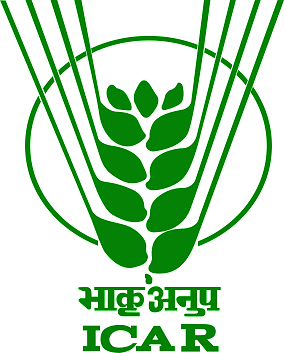Indian Council of Agricultural Research
Indian Council of Agricultural Research
The Indian Council of Agricultural Research (ICAR) is an autonomous organization under the Department of Agricultural Research and Education (DARE), Ministry of Agriculture and Farmers Welfare, Government of India. Established on 16 July 1929, ICAR is headquartered in New Delhi. It is the apex body for coordinating, guiding, and managing research and education in agriculture, including horticulture, fisheries, and animal sciences in the entire country.
History[edit | edit source]
ICAR was established as the Imperial Council of Agricultural Research in 1929, following the report of the Royal Commission on Agriculture in India. The name was changed to the Indian Council of Agricultural Research in 1946. Over the years, ICAR has played a pivotal role in ushering the Green Revolution and subsequent developments in agriculture in India through its research and technology development.
Objectives[edit | edit source]
The primary objectives of ICAR include:
- Promoting and coordinating agricultural research and education.
- Disseminating information on agricultural research and technology.
- Providing consultancy services in agriculture.
- Developing linkages at national and international levels with related organizations.
Structure[edit | edit source]
ICAR operates through a network of 113 institutes, 4 deemed universities, 65 agricultural universities, and 14 national research centers. It also has 79 All India Coordinated Research Projects (AICRPs) and 19 national bureaus.
Research and Development[edit | edit source]
ICAR has been instrumental in the development of high-yielding varieties of crops, improved breeds of livestock, and innovative farming techniques. It has contributed significantly to the Green Revolution, White Revolution, and Blue Revolution in India.
Education[edit | edit source]
ICAR is responsible for the accreditation of agricultural universities and colleges in India. It also conducts the All India Entrance Examination for Admission (AIEEA) to undergraduate, postgraduate, and doctoral programs in agriculture and allied sciences.
Achievements[edit | edit source]
Some of the notable achievements of ICAR include:
- Development of high-yielding varieties of wheat, rice, maize, and pulses.
- Introduction of integrated pest management techniques.
- Advancements in dairy farming and fisheries.
- Promotion of sustainable agriculture practices.
Related Pages[edit | edit source]
- Ministry of Agriculture and Farmers Welfare
- Green Revolution in India
- White Revolution in India
- Blue Revolution in India
- Department of Agricultural Research and Education
- Agricultural Universities in India
See Also[edit | edit source]
References[edit | edit source]
External Links[edit | edit source]
Search WikiMD
Ad.Tired of being Overweight? Try W8MD's physician weight loss program.
Semaglutide (Ozempic / Wegovy and Tirzepatide (Mounjaro / Zepbound) available.
Advertise on WikiMD
|
WikiMD's Wellness Encyclopedia |
| Let Food Be Thy Medicine Medicine Thy Food - Hippocrates |
Translate this page: - East Asian
中文,
日本,
한국어,
South Asian
हिन्दी,
தமிழ்,
తెలుగు,
Urdu,
ಕನ್ನಡ,
Southeast Asian
Indonesian,
Vietnamese,
Thai,
မြန်မာဘာသာ,
বাংলা
European
español,
Deutsch,
français,
Greek,
português do Brasil,
polski,
română,
русский,
Nederlands,
norsk,
svenska,
suomi,
Italian
Middle Eastern & African
عربى,
Turkish,
Persian,
Hebrew,
Afrikaans,
isiZulu,
Kiswahili,
Other
Bulgarian,
Hungarian,
Czech,
Swedish,
മലയാളം,
मराठी,
ਪੰਜਾਬੀ,
ગુજરાતી,
Portuguese,
Ukrainian
Medical Disclaimer: WikiMD is not a substitute for professional medical advice. The information on WikiMD is provided as an information resource only, may be incorrect, outdated or misleading, and is not to be used or relied on for any diagnostic or treatment purposes. Please consult your health care provider before making any healthcare decisions or for guidance about a specific medical condition. WikiMD expressly disclaims responsibility, and shall have no liability, for any damages, loss, injury, or liability whatsoever suffered as a result of your reliance on the information contained in this site. By visiting this site you agree to the foregoing terms and conditions, which may from time to time be changed or supplemented by WikiMD. If you do not agree to the foregoing terms and conditions, you should not enter or use this site. See full disclaimer.
Credits:Most images are courtesy of Wikimedia commons, and templates Wikipedia, licensed under CC BY SA or similar.
Contributors: Prab R. Tumpati, MD

